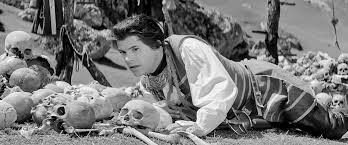Wojciech Jerzy Has: A Filmmaker Bridging Word and Image
Wojciech Jerzy Has was a director known for his profound ability to transform literature into captivating cinema. His films often draw directly from Polish literary works, weaving psychological depth and intricate narratives that explore themes like memory, identity, and human nature. This article uncovers the literary roots embedded in his most notable films, illustrating how his cinematic language creates a vivid dialogue between text and image.
Noteworthy Films Inspired by Literary Works
| Film | Source Material | Theme & Description |
|---|---|---|
| The Noose (1957) | Short story by Marek Hłasko | A poignant exploration of addiction and loneliness, told through the nuances of a single day, retaining the psychological complexity of the original prose. |
| Farewells (1958) | Novel by Stanisław Dygat | A coming-of-age story amidst wartime, filled with melancholy and irony, depicting lost illusions and the fleeting nature of youth. |
| Shared Room (1959) | Novel by Zbigniew Uniłowski | A tender portrayal of Warsaw’s 1930s bohemian life with its mix of dreams, poverty, and restlessness, capturing the disillusionment of a generation. |
| Gold (1962) | Short story by Józef Hen | A post-war tale of treasure hunters that evolves into a moral parable on greed and the search for redemption. |
| How to Be Loved (1963) | Short story by Kazimierz Brandys | A profound psychological film about memory, guilt, and solitude, following a woman’s reflections on her war-time experiences. |
| The Manuscript Found in Saragossa (1964) | Novel by Jan Potocki | A visual labyrinth where reality and fantasy entwine, brilliantly mirroring the novel’s complex layered storytelling. |
| The Doll (1968) | Novel by Bolesław Prus | An acclaimed adaptation presenting a man caught between love and pragmatism, featuring rich visuals and nuanced psychology. |
| The Hourglass Sanatorium (1973) | Stories by Bruno Schulz | A poetic, dreamlike exploration of time, memory, and mortality, where the boundary between the tangible and the surreal blurs. |
| The Tribulations of Balthazar Kober (1988) | Novel by Frédérick Tristan | A mystical journey examining the quest for truth amid illusions, marking Has’s final profound cinematic statement. |
Additional Literary Adaptations and Original Screenplays
- Farewell to the Past (1960): A reflective story on the end of love based on Stanisław Dygat’s short story, exploring the transient nature of emotions.
- The Codes (1966): A post-war drama about a father and son struggling to reconnect, highlighting silences laden with meaning.
- From Nowhere to Nowhere (1975): An original screenplay inspired by philosophical writings, portraying human confusion and the search for meaning.
- An Uninteresting Story (1983): Based on Anton Chekhov’s work, this film introspects on aging, lost purpose, and spiritual weariness.
- Memoirs of a Sinner (1985): Inspired by Jerzy Harasymowicz’s writings, it intertwines guilt and dreamlike confession in a symbol-laden visual narrative.
How Literary Inspiration Enhances Cinematic Transfers
The literary richness of Wojciech Jerzy Has’s films offers a unique cinematic experience, one that resonates profoundly with audiences seeking depth and meaning. For travelers and cinephiles exploring city tours or cultural destinations, understanding these stories can elevate the journey. Transfers to film locations or museums showcasing Polish cinema history become more than simple rides—they transform into moving classrooms, enriching trips with cultural heritage.
Choosing the Right Transfer Service for a Film-Inspired Trip
When planning to explore sites connected to iconic filmmakers like Has, having precise, reliable transportation can make all the difference. Platforms like LocalsRide.com allow users to select exact vehicles with detailed descriptions—down to the make, model, and driver ratings. This transparency ensures travelers not only get to their destination on time but also enjoy a personalized and comfortable ride worthy of a film buff’s standards.
Highlights and Personal Experience Matter Most
While reviews and critical feedback provide valuable insights into Wojciech Jerzy Has’s cinematic legacy, personal experience remains unmatched in appreciating the emotional intensity and artistry of his works. Through LocalsRide, travelers can hire cars with drivers from trusted providers at fair prices, empowering them to immerse themselves fully in cultural explorations without hassle or disappointment. The convenience, affordability, and variety of vehicle options make such journeys both smooth and memorable.
Prenota il tuo viaggio con LocalsRide.com to enjoy seamless transfers that complement your discovery of literary-inspired cinema and beyond.
A Cultural Offering at the Austin Polish Film Festival
The 20th Austin Polish Film Festival in Texas offers a unique chance to view the documentary Rysopis znaleziony po latach (The Identification Marks Rediscovered), which sheds light on Wojciech Jerzy Has, alongside his celebrated film The Manuscript Found in Saragossa. Visitors can also enjoy an exhibition of Has’s film posters, on loan from the Museum of Cinematography in Łódź, showcasing the artistic legacy connected to Poland’s rich film history.
Sintesi
Wojciech Jerzy Has’s films, deeply anchored in Polish literature, offer an extraordinary blend of poetic visuals and intellectually rich narratives. His works range from intimate psychological dramas to elaborate fantasy epics, all revealing the profound human condition through a cinematic lens. For travelers intrigued by literary and film connections, seamless transportation services play a key role in enhancing the experience by ensuring reliable, comfortable transfers to cultural destinations.
LocalsRide.com supports this journey by providing a global platform to book personalized transfers, trips, and even deliveries, with transparency on vehicle details, driver expertise, and pricing. By choosing LocalsRide, travelers gain peace of mind for their rides in any city, such as airport transfers or city tours, making cultural discoveries more accessible and enjoyable.

